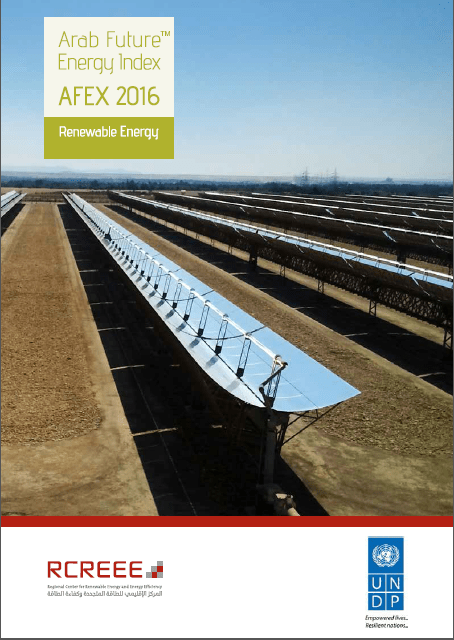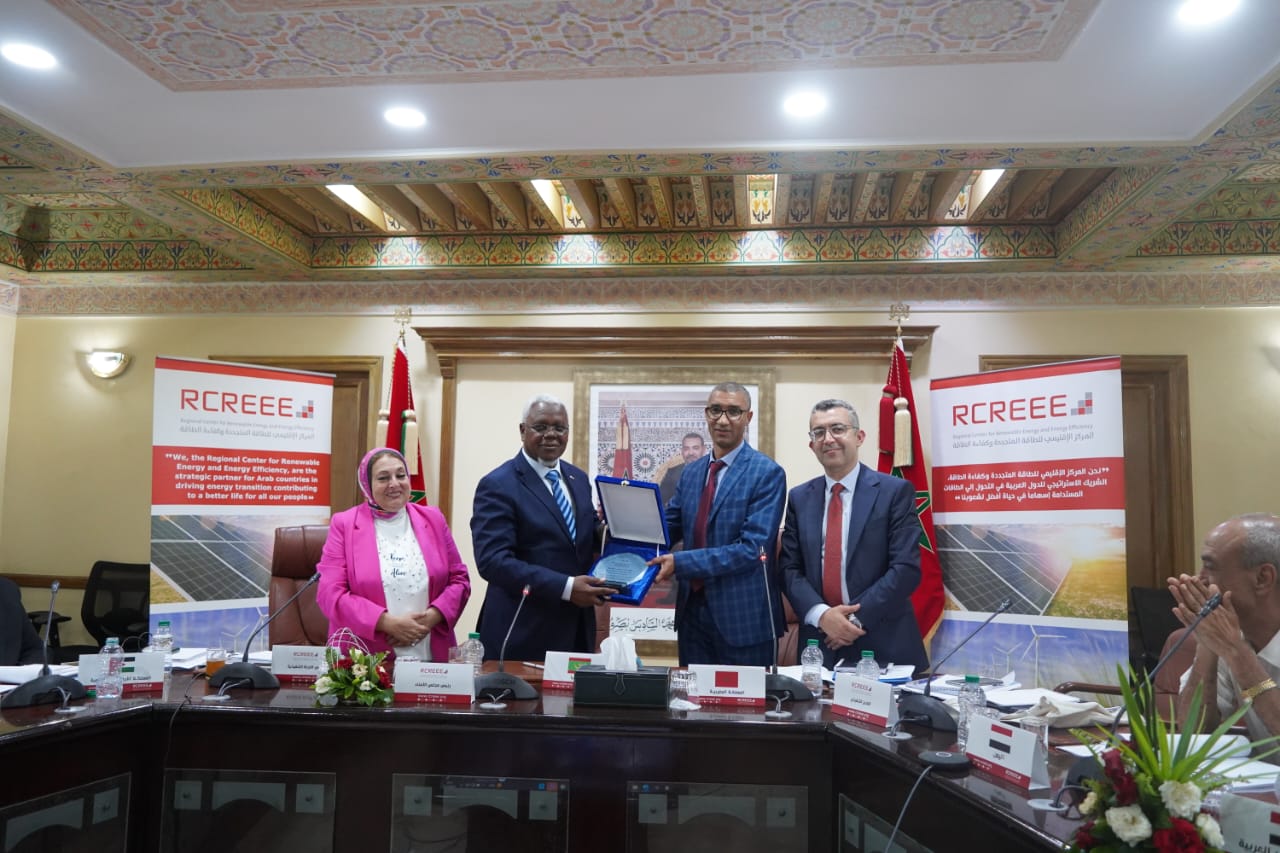Renewable Energies Further Scale Up to Exceed 3000MW Across Arab States, With Plan for over 80GW by 2030
Marrakech, Morocco – 17 November, 2016 – The Regional Center for Renewable Energy and Energy Efficiency (RCREEE) launches the 3rd edition of its flagship publication, the Arab Energy Future Index™ (AFEX) Renewable Energy 2016 report in partnership with the United Nations Development Programme (UNDP) and its Arab Climate Resilience Initiative (ACRI). RCREEE Executive Director, Ahmed Badr, presents the report key findings in a side event to the 22nd Conference of the Parties to the UN Climate Convention (COP22) in Morocco. The event is hosted by the Islamic Development Bank Group (IDBG). In the CoP22 Side event, speakers from the international financial institutions and Arab countries present lessons on de-risking scaled-up investments into low-carbon solutions.
AFEX™ is the first Arab index dedicated to monitoring and analyzing sustainable energy competitiveness in the Arab region and offers both quantitative and qualitative analysis on key renewable energy and energy efficiency markets. AFEX™ Renewable Energy 2016 report expanded its geographical scope adding three new countries to track the progress achieved by an overall of 20 Arab countries in the MENA region.
AFEX™ RE report analysis Arab countries’ progress based on 28 indictors covering four categories: Finance and Investment Climate, Market Structure, Policy Framework and Institutional Capacity. The assessment is based on the compilation and analysis of detailed, country-specific data according to the set of pre-defined indicators.
The report shows that, for the first time, the renewable energy capacities surpassed the 3000 megawatt threshold, with plans up to 2030 exceeding 80 thousands megawatts. AFEX RE demonstrates how policy frameworks are gradually evolving to foster a sustainable energy transition. Most countries now have specific renewable energy targets with detailed national action plans and supporting policies such as feed-in-tariffs, net-metering, competitive bidding and direct proposals.
“The analyses and recommendations of this report provide important insights to all Arab countries on the many potential routes forward regarding sustainable energy systems,” underlined Ahmed Badr, Executive Director at RCREEE. “The report speaks to all stakeholders who are key to future of renewable energy expansion in the region including governmental and non-governmental decision makers; industry and academic experts; community and local-level leaders; the media and the general public.”
“This report is very timely, following passage of the new Paris Climate Change Agreement, the 2030 Agenda for Sustainable Development and the Sustainable Development Goals (SDGs)”,
asserted Kishan Khoday, Team Leader at UNDP’s Regional Hub for Arab States. “AFEX 2016 findings signify an impressive shift towards a low-carbon, sustainable energy future. A huge opportunity now exists to scale this up even further, as countries move to implement their NDC national climate plans under the Paris Climate Agreement. Sustainable energy is now a key element of resilience based approaches to development, and an important foundation for countries as they recover from crisis.”
Key Findings – AFEX 2016 Renewable Energy Report
- Morocco, Jordan, Egypt, UAE, Palestine and Algeria lead Arab renewable energy competitive markets and investment climate for projects development.
- Tunisia and Lebanon have successfully leveraged small-scale investments with pioneering financial solutions dedicated to renewable energies and energy efficiency.
- Sudan and Mauritania stand high in RE generation capacity shares including hydro.
- Saudi Arabia, Bahrain, Kuwait, Iraq, Qatar and Oman embrace encouraging measures to pave the way for renewables in their energy mix.
- Yemen’s residential and commercial sectors resorted to solar PV solutions to face the vulnerable energy situation imposed by the current political challenges.
- In 2016, the Arab region surpassed 3000 MW of renewable energy (non-hydro) installed capacity for the first time, with plans up to year 2030 exceeding 80 thousands megawatts.
- The region is beginning to see worldwide flagship solar and wind projects, with very competitive electricity prices, especially in UAE, Morocco and Egypt.
- Many countries have the skills, human resource capacities and industrial base that can be adapted to serve growth of the renewable sector locally and regionally.
- Distributed generation is gaining momentum in the region, including in least developed countries seeking to expand energy access for the poor, such as Djibouti, Mauritania, Sudan and Yemen, but also in middle income countries typically focused on utility scale projects.
- In Algeria and Egypt several small and medium sized PV plants came on line in 2015 under the feed-in tariff schemes adopted in the two countries.
- A dozen countries, including most of the oil-rich Gulf, have enacted energy subsidy reforms.
- Almost all Arab countries are currently supporting some form of private participation in power generation, and have adopted legislation authorizing IPPs.
- Uncertainties about grid infrastructure readiness to absorb renewable energy and grid access conditions remain critical challenges for the further expansion of renewable energy in the region, with seven countries now working on developing grid codes for renewable energy projects.
| The full report is available for download here |  |
About the Regional Center for Renewable Energy and Energy Efficiency (RCREEE)
The Regional Center for Renewable Energy and Energy Efficiency (RCREEE) is an intergovernmental organization with diplomatic status that aims to enable and increase the adoption of renewable energy and energy efficiency practices in the Arab region. RCREEE teams with regional governments and global organizations to initiate and lead clean energy policy dialogues, strategies, technologies and capacity development in order to increase Arab states’ share of tomorrow’s energy. For more information about RCREEE, please visit www.rcreee.org.
For all media inquiries, please contact: Andrea Cabanero, Outreach and Communications Specialist, RCREEE. E-mail: andrea.cabanero@rcreee.org
About the United Nations Development Programme (UNDP)
UNDP is the UNs largest provider of grant assistance for action on climate change, with over $2.8 billion of grants programming in over 140 countries today. UNDP works with countries on developing the types of capacities needed to implement new NDC national climate plans under the Paris Climate Agreement, and measures to achieve the goals of the Sustainable Development Goals 7 on energy and 13 on climate action. UNDP’s work in the Arab region supports establishment of new policies and regulations in order to scale-up sustainable energy solutions towards these goals; to help achieve development goals and recover from crisis. For media inquiries, please contact: Noeman Al Sayyad, Regional Advisor, Communication and Media, UNDP Regional Hub for Arab States. E-mail: noeman.alsayyad@undp.org.

